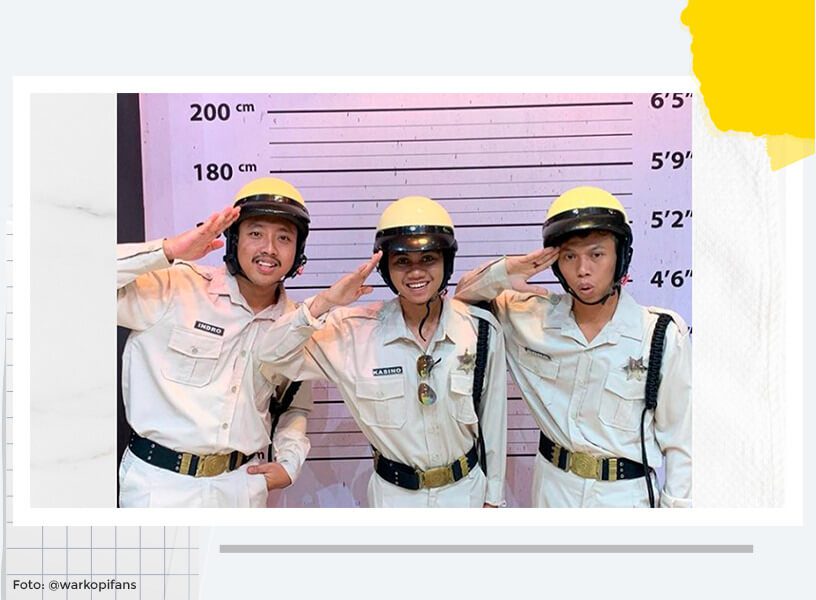In these last few weeks, the entertainment industry becomes colorful due to the emergence of ‘Warkopi’, who brought Dono, Kasino, Indro (often cited Warkop DKI) style and feel of a legendary comedy. Similarly to Warkop DKI, Warkopi consists of the three youth man: Alfin, Sepriadi, and Alfred. Warkopi whereabouts is initiated by these three young people, which bears a resemblance to its predecessors, Warkop DKI. This is what makes Warkopi famous even more.
Is That a Copyright Infringement from The Presence of Warkopi?
Referring to Law Act Number 28 2014 about Copyright, Copyrights is the exclusive property rights of the creator that arises automatically after a work has a real form (Chapter 1 section 1 Copyright Law). Copyright protects creations in the fields of science, art, and literature (Chapter 1 section 3 Copyright Law). Every creator or copyright holder has inherent moral rights and/or economic rights. Referring to Chapter 5 section (1), Moral rights is the rights of the creator to maintain the integrity and/or acknowledgment of the ownership of the creation which is eternally inherent in the creator (listed or not). Nevertheless, if the creator has died, the heirs of the creator can hold and exercise those moral rights based on inheritance/will/other reasons (Chapter 5 section 2 Copyright Law)
Meanwhile, economic rights is the rights of creators and/or copyright holders to enjoy all economic benefits over their creations based in article 8 Copyright Law. What makes the difference between economic rights and moral rights is seen from the period of protection, which is around 20-70 years, according to the type of creation which is regulated in article 58 and 59 Copyright Law.
Not only that, film actors, dancers, singers, comedians and other actors have economic and moral rights (related rights) for their actions. In this case, legendary trio or well known as Warkop DKI, they have moral and economic rights to each appearance, along with the protection of the characteristics of each character.
Seeing the actions taken by Warkopi, in fact, if they only imitate concepts of Warkop DKI, such as comedic style or dress style (not exactly the same), Warkopi cannot be subjected to copyright infringement, because copyright does not protect the concept of a work, but it must be created in a tangible form. However, if Warkopi imitates characters, recreates scenes, or even sings Warkop DKI songs again, then Warkopi has violated the rights related to the legendary trio. Moreover, in carrying out the action, it can boost the fame of Warkopi, and related rights holders are required to receive compensation in the form of royalty payments (article 35 section 2 Copyright Law). So, Indro as the heir of Kasino and Dono, has the right to any profits obtained by Warkopi and has the right to sue Warkopi or Alfin, Sepriadi, and Alfred separately which without rights and consent infringes of copyright that belong to Dono, Kasino, and Indro (article 98 section 2 Copyright Law)
Warkop DKI Have been Officially Registered as Trademarks
Trademarks is a sign in the form of an image, name, word, letters, numbers, color arrangement, or a combination of these elements which have distinguishing features and are used in the activities of trading in goods or services
Before registering a trademark, you must know about the class and description of the type (Sub-Class) of goods and/or services. According to Article 4 section (2) letter f of Law Act Number 20 of 2016 about Trademarks and Geographical Indications, one of the things that must be included in the trademark registration application form is the Trademark Class and Trademark Sub-Class. In fact, Chapter 12 of the Trademark Law states that an applicant who does not meet the formality requirements for a certain period of time, his application will be considered withdrawn.
Trademarks class is a grouping of a line of business run by the brand concerned. Warkop DKI is registered in class number 41 (education, entertainment, and sports and the arts), class of 16 (technology product), class of 35 (advertising, business management and administration, and office functions), and class of 43 (food and beverages).
Related to trademarks, the owner of a registered mark and/or the recipient of a trademark license may file a lawsuit against another party without the right to use a mark that has similarities in principle or in its entirety for similar goods and/or services (chapter 83 Trademarks and Geographical Indications Law).
What is meant by “similarity” is basically the resemblance caused by the presence of a dominant element between one brand and another, giving rise to the impression of a similarity, both in terms of form, placement method, method of writing or combination of elements, as well as similarities in the sound of speech contained in the text.
If the name “Warkopi” is found to have similarities in principle or in its entirety to the registered name of Warkop DKI, then Warkop DKI can file a lawsuit against Warkop. However, if the name “Warkopi” has obtained permission from Warkop DKI, then Warkopi can continue to use that name.
This case can certainly be a valuable lesson for all creative people. That in the work there are important signs related to Copyright where we cannot commercialize existing works without permission, especially the name that have been registered. If Partners need further information regarding Copyright and Mark registration, please do not hesitate to contact us at marketing@ambadar.co.id

